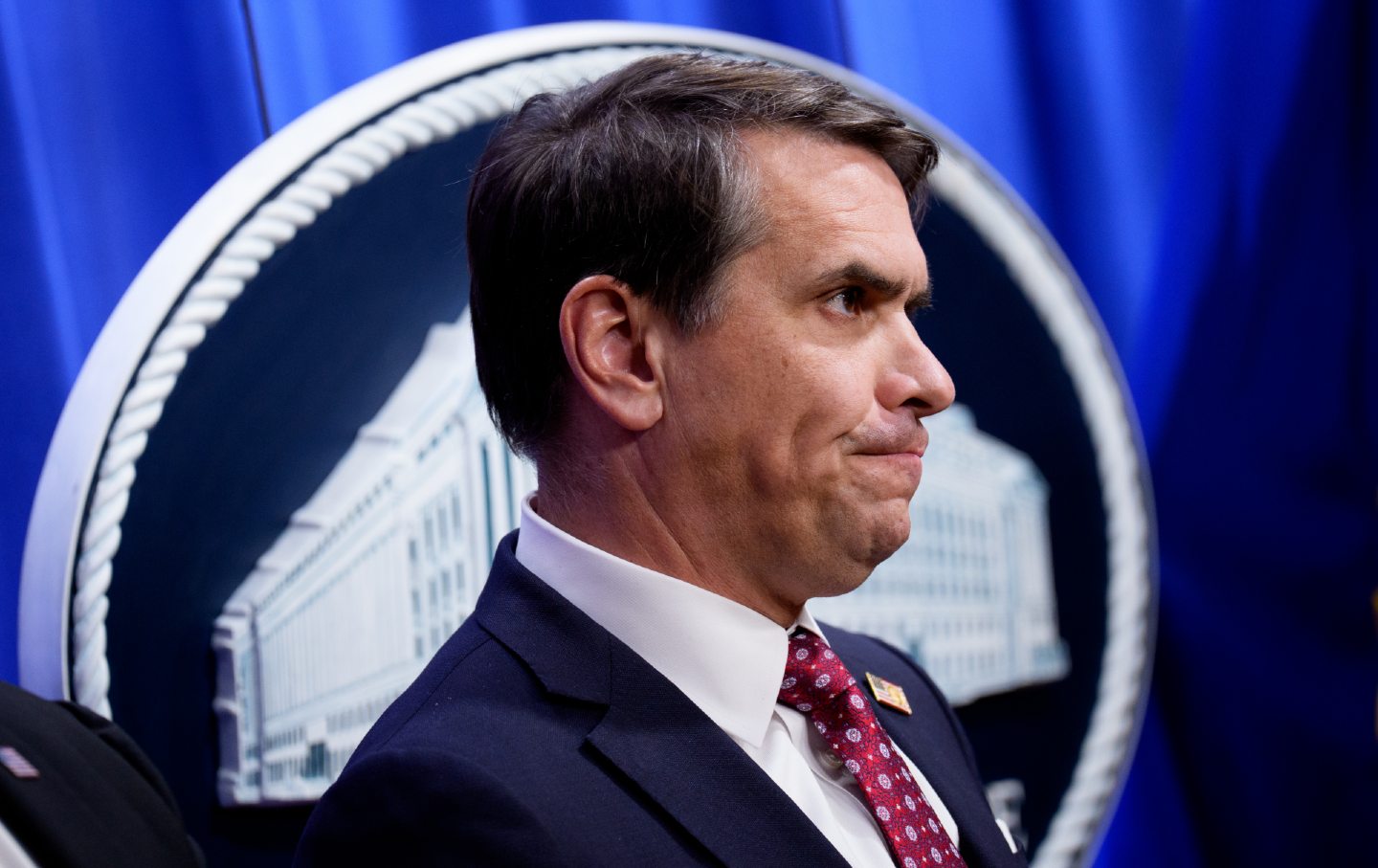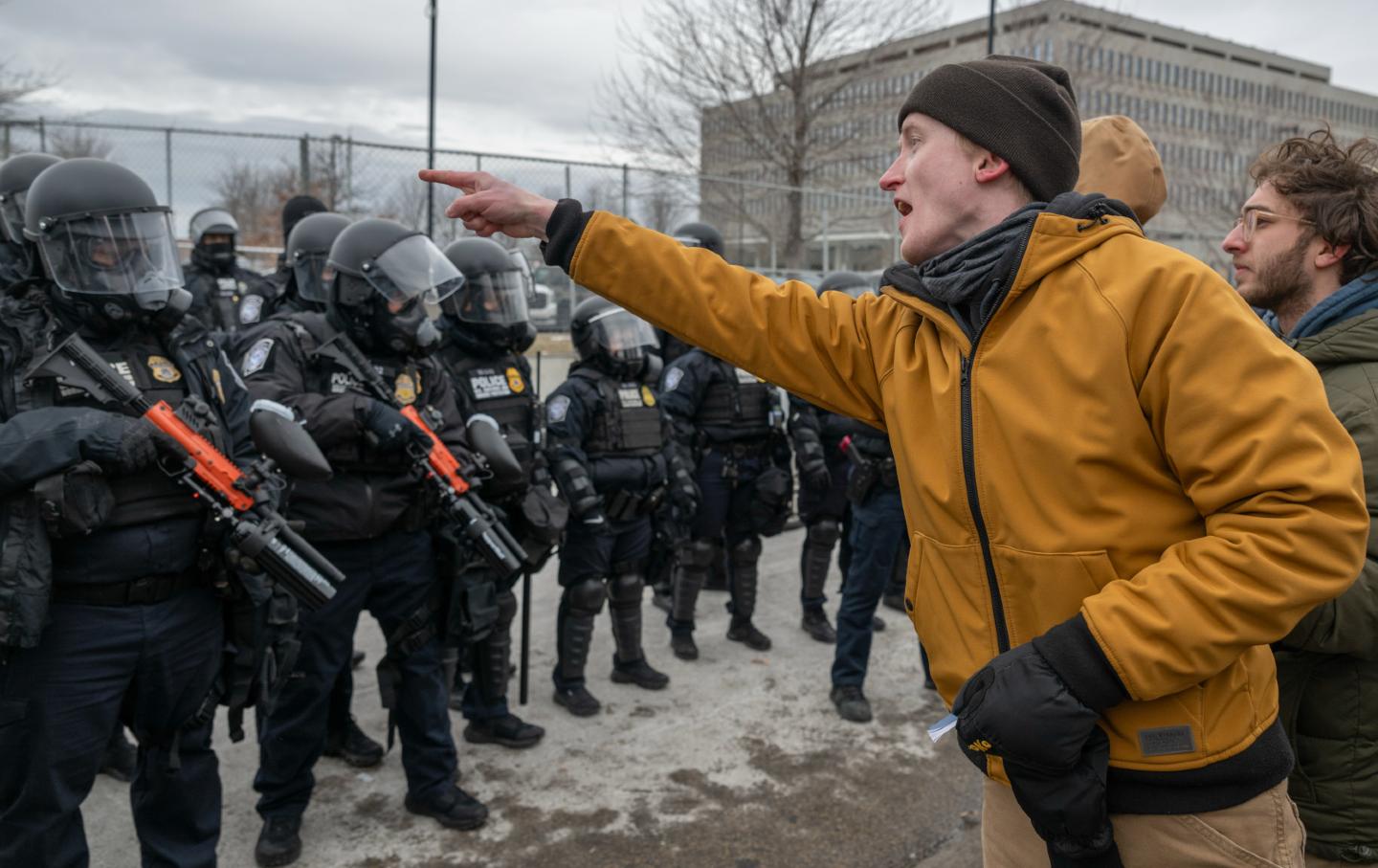Mike Johnson’s Creed Does Not Extend to Saving the Lives of Innocents in the Holy Land
While Pope Francis and religious leaders of all backgrounds call for a ceasefire in Gaza, the new speaker of the House is all in for war.

House Speaker Mike Johnson (R-La.) on Capitol Hill on Thursday, October 26, 2023.
(Jabin Botsford / The Washington Post via Getty Images)Mike Johnson’s conservative colleagues greeted his election as Speaker of the House by posting images of the Louisiana politician kneeling on the floor of the House in a prayer circle with other evangelical Republicans. That, suggested US Representative Greg Steube (R-Fla.), should be read as proof that the new speaker is “not afraid to look to his faith for guidance.”
Prayer is nothing new in American politics. Abraham Lincoln urged prayer during the Civil War for “the restoration of our now divided and suffering country to its former happy condition of unity and peace.” John Kennedy, while he went out of his way to explain that “I do not regard religion as a weapon in the Cold War,” took time on day two of the Cuban missile crisis to pray at Washington’s St. Matthew’s Cathedral. And, of course, the House and Senate begin each of their sitting days with a prayer from chaplains of all faith traditions.
Yet using the House floor itself for a prayer circle is a less common sight, which could be why Johnson’s very public and very political gesture—which took place during this year’s initial battles over Republicans efforts to fill the speakership—was greeted with skepticism on the part of veteran observers of Washington such as David Cay Johnston. The journalist and author argued that “members praying on the House floor offends both our Constitution and the New Testament, which denounces public displays of devotion.”
Johnston was, presumably, referencing the Book of Matthew, which recounts the Sermon on the Mount’s counsel: “And when thou prayest, thou shalt not be as the hypocrites are: for they love to pray standing in the synagogues and in the corners of the streets, that they may be seen of men.”
Obviously, Johnson and Johnston interpret the Christian Bible differently. But it is hard to misconstrue the adjoining section of the Sermon on the Mount, in which the Nazarene preached:
Ye have heard that it hath been said, Thou shalt love thy neighbour, and hate thine enemy.
But I say unto you, Love your enemies, bless them that curse you, do good to them that hate you, and pray for them which despitefully use you, and persecute you;
That ye may be the children of your Father which is in heaven: for he maketh his sun to rise on the evil and on the good, and sendeth rain on the just and on the unjust.
For if ye love them which love you, what reward have ye? do not even the publicans the same?
And if ye salute your brethren only, what do ye more than others? do not even the publicans so?
Be ye therefore perfect, even as your Father which is in heaven is perfect.
This reading from Matthew, which has often served as an underpinning of advocacy for diplomacy and peacemaking, is one that Pope Francis returns to frequently, as he advocates for reconciliation in even the most difficult and divisive moments. Just last month, in a Vatican address, the pope reflected on the Sermon on the Mount and explained, “Forgiveness is the oxygen that purifies the air of hatred; forgiveness is the antidote to the poisons of resentment; it is the way to defuse anger and heal so many maladies of the heart that contaminate society.”
Now, as Israel’s government responds to the horrific attack on kibbutzim and a music festival, which left roughly 1,400 Israelis dead, with a horrific military assault on Gaza, which so far has killed more than 8,000 Palestinians, Pope Francis is calling for a cease-fire. “We say ‘ceasefire, ceasefire’. Brothers and sisters, stop!” the pontiff declared Sunday in St. Peter’s Square. “War is always a defeat, always.”
Yet, at the same time that the pope was pleading to save the lives of innocent men, women and children in Gaza, Johnson was explicitly rejecting talk of a cease-fire, fully embracing the hard-line militarism of Israeli Prime Minister Benjamin Netanyahu and promising to “work swiftly to pass legislation to provide Israel much needed resources in their fight against these barbarians.”
Johnson’s position is only a bit more hard-edged than that of President Biden and Democratic leaders in the House and Senate. But it is notable that Johnson, who has positioned himself as so biblically inspired that he told Sean Hannity the best way to know his “worldview” is to “go pick up a Bible off your shelf and read it,” is so at odds with the moral messaging of religious leaders and faith-based international aid groups that are calling for a cease-fire.
The pope is not alone in pleading for peace and saying, “Let no one abandon the possibility that the weapons might be silenced—let there be a ceasefire.”
Last Friday, 80 rabbis and rabbinical students, many of them leaders of Jewish congregations across the United States, issued a call for a cease-fire. In it, they expressed horror at the October 7 attack and demanded the release of hostages taken that day, while bemoaning the fact that “the U.S. and Israeli governments are using our grief to justify genocidal violence directed against the people of Gaza.”
One of the signers of the call, Rabbi Laurie Zimmerman of Congregation Shaarei Shamayim in Madison, Wis., has explained, “Now is the time to embrace our deepest values and protest this bloodshed.”
Popular
“swipe left below to view more authors”Swipe →Dozens of Jewish, Muslim and Christian groups—including the National Council of Churches, the Episcopal Church, the Evangelical Lutheran Church in America, the Unitarian Universalist Association, the United Methodist Church’s General Board of Church and Society, the Unitarian Universalist Association, the United Church of Christ, the American Friends Service Committee, the Mennonite Central Committee, the Church of the Brethren’s Office of Peacebuilding and Policy, the Council on American-Islamic Relations, and Jewish Voice for Peace Action—are doing just that. They have signed an urgent call for a cease-fire, imploring “Congress and the Administration to abstain from rhetoric that exacerbates violence and to unequivocally condemn all violations of international law.” Their statement does not take a side; it simply seeks “an immediate ceasefire to prevent the tragic loss of more innocent Palestinian and Israeli lives.”
Yet Mike Johnson has closed the book on advocacy—be it morally inspired or simply practical—for peace in the Middle East.
More from The Nation

A Trump Administration Official Says It Won’t Investigate the Killing of Renee Good A Trump Administration Official Says It Won’t Investigate the Killing of Renee Good
Deputy Attorney General Todd Blanche makes clear that the Department of Justice won’t look into the death of Renee Good—but that won’t stop Minnesota from investigating.

Martin Luther King Jr.’s Dream: Love Against Racism Martin Luther King Jr.’s Dream: Love Against Racism
As Dr. King reminded us, “Hate cannot drive out hate; only love can do that.” His words continue to call us toward justice, compassion, and the power of love to confront racism.

It’s Official: The People, Not the Politicians, Are Leading It’s Official: The People, Not the Politicians, Are Leading
In this week’s Elie V. US, our justice correspondent explores the fecklessness of the Democratic Party, MAGA racism, and fighting despite unwinnable odds.

The Week of Colonial Fever Dreams From a Sundowning Fascist The Week of Colonial Fever Dreams From a Sundowning Fascist
The news was a firehose of stories of authoritarian behavior. We can’t let ourselves drown.

Self-Appointed King of Venezuela Self-Appointed King of Venezuela
The United States attacks Venezuela and captures President Maduro. Trump claims that the US will “run” the country for oil interests.



